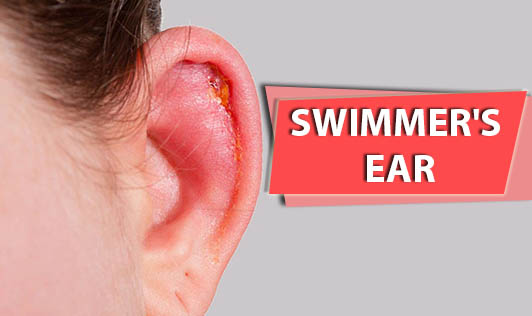Swimmer's Ear
- 58 months ago
Swimmer's ear is an inflammation and infection in the outer ear canal that runs from the eardrum to the outside of one's head. This is often caused by water that remains in the ear after swimming, creating a moist environment that aids bacterial growth. Using too many cotton swabs, putting fingers or other objects inside the ear can also lead to swimmer's ear.
The most common cause for swimmer's ear is bacteria invading the skin inside one's ear canal. The symptoms and signs associated with Swimmer's ear depend on the progression of the infection.
Mild signs and symptoms
- Drainage of clear, odorless fluid
- Slight redness inside one's ear
- An itchy feeling in one's ear canal
- A mild discomfort that's made worse by pulling on the outer ear or pushing on the little bump in front of the ear
Moderate progression symptoms
- Increased pain
- Decreased hearing
- Pus discharge
- Intense itching
- Excessive fluid drainage
- Fullness inside one's ear and partial blockage of the ear canal caused by swelling, fluid, and debris Advanced progression
- Total blockage of the ear canal and fever
- Swelling and redness of the outer ear
- Intense pain that may radiate to one's face, neck and side of the head
Factors that may increase one's risk of swimmer's ear include:
- Having a narrow canal that can easily trap water
- Swimming itself or swimming in water with elevated bacteria levels
- Using ear devices such as headphones or hearing aid
- Allergies and irritation from hair spray, jewelry or hair dyes
- Cleaning of the ear canal with cotton swabs and other objects
Consider these simple tips to avoid swimmer's ear:
- Swim in a clean pool and watch out for signs alerting high bacteria counts.
- Keep your ears dry by drying only the outer ear. Wipe slowly and gently with a soft towel or cloth.
- Don't use foreign objects in your ears, such as paper clips or hairpins, these can irritate the skin inside the ear and break the skin.
- Protect your ears by using cotton balls inside your ears whenever you're applying products such as hair spray or hair dyes.
If you're experiencing severe pain and other signs and symptoms of swimmer's ear, contact your doctor immediately!




